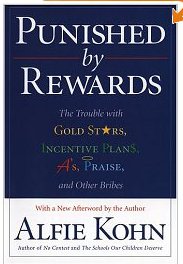 In Part 1 I discussed Kohn's argument for rewards/punishments creating self-centered individuals and how urging a focus on rewards/punishments can have unintended consequences by encouraging short-cutting the desired behavior in order to satisfy the requirements of receiving the reward or avoiding the punishment.
In Part 1 I discussed Kohn's argument for rewards/punishments creating self-centered individuals and how urging a focus on rewards/punishments can have unintended consequences by encouraging short-cutting the desired behavior in order to satisfy the requirements of receiving the reward or avoiding the punishment.
In Part 2 I discussed motivation and the interaction between it and rewards/punishments.
Here, in Part 3, I will go over Kohn's suggested alternatives to rewards and punishments.
-----------------
If you have now bought in to the idea that rewards and punishments are not only ineffective but counter-productive, long term, (and even if you haven't) then you likely want to know what Kohn suggests as an alternative.
He starts with an important question, "What is your goal?" If your goal is to simply elicit compliance with your demands then there may not be an alternative to rewards and punishment and you probably don't need one. So the first question is, do you want blind obedience or internalization of principles? Back in part 1 I asked you to consider the question of what is is you want your employee/student/child to achieve. This is where it really matters.
When parents are asked what kind of people they want their children to become they usually respond with things along the lines of: caring, responsible, hard working, self reliant, upstanding, principled, etc. Unfortunately, with the possible exception of "hard working," rewards/punishments will help develop none of these qualities.
Rewards and punishments make an appeal to authority and self-interest for why we should behave certain ways. You do this because someone in authority says so and if you don't that person will make your life unpleasant. You do that because someone in authority says so and if you do that person will make your life more pleasant. It's condescending. But it does encourage unquestioning obedience to power. It reinforces the idea that "might equals right." But we can pretty much all agree that it is a flawed sentiment. It is not inherently correct to obey someone because they have more power than you do.
They also contribute to the idea that it's OK to manipulate the people around you to get what you want. Is that not exactly what is happening when a parent bribes a child to pick up their toys? Is that not exactly what is happening when a teacher promises a class party if everyone gets an A on the test? And is that not exactly what is happening when an employer promises bonuses to (or threatens firing) employees based on their performance?
Just think how disturbing it would be to witness a husband tell his wife, "If you have all the floors clean when I come home I'll bring you some flowers." So why do we think it's fundamentally different when we turn around and say to a child, "If you pick up all your toys I'll give you some ice-cream."? It seems clear that the lesson is that manipulation is not only acceptable, but desirable.
The Alternatives
One piece of the alternative solution is to appeal to reason and empathy in our behavioral guidance (in so far as the situation permits). "Because I said so" is one of the most useless phrases of parenting and almost universally breeds resentment. It directly says that there isn't any meaningful reason to take this action other than I want you to and I'm in charge so you have to do as I say. It comes with no influencing power except the threat of punishment for non-compliance.
Instead of threats or bribes, Kohn suggests explaining the reasoning behind a request. A calm reasoned approach to help a person understand why they should do something. As a manager telling your employees they'll be working late tonight is disrespectful. Explaining to them that such-and-such needs to be done before tomorrow morning, and that you realize it's unpleasant to stay late, is less likely to result in disgruntled resentment (though it probably still won't make anyone happy).
Explaining to a student the utility of learning calculus is more effective (at least it was for me) than just saying it's part of the curriculum. This idea really resonated with me because I always found a subject more interesting if I could see useful applications of it within my life. Understanding that calculus was invented in order to accurately describe physics made it more interesting (especially when applied to specific problems). Doing contrived problem set after contrived problem set of multi-variable equations while in college was not interesting.
Now, I'm sure every parent is going scoff at the idea of calmly explaining to your toddler why drawing on the wall with poop is unacceptable. But what are they learning if you punish them? They might learn that drawing on the wall with poop is unacceptable, they might learn that they need to be more careful not to get caught, or they might learn that you're mean and bully people around. You don't get to control what they learn from the punishment. So is trying to explain really such a horrible thing?
For those wondering, yes, Alfie Kohn does have children. He freely admits that it is hard to use his recommended approach. It requires a lot of patience. It is much less effort to simply bribe or threaten, but the research still stands that the long-term consequences will be negative.
"Working with" Rather than "Doing to"
One of Kohn's themes is the idea of approaching children with an attitude of "working with" rather than "doing to." He suggests that at some point our relationship with our children needs to change from doing things to them to doing things with them (or working with them to solve problems). When you have an infant you take them on a walk. As they grow our mindset should change to going on a walk with them. This is the fundamental shift behind the idea of working with rather than doing to.
To acknowledge that at some point the child is becoming an individual with their own ideas, emotions, and desires is to realize that doing things "to" them can be as disrespectful as doing things "to" another adult. He suggests we can apply the three C's to help with this process: Content, Collaboration, Choice. And I'll keep this brief, since we're running quite long now.
Content
Kohn suggests we should reevaluate our requests. Does what we're asking make sense? Is it reasonable? Is there a good reason behind it or is it solely for our convenience? Is it fair to demand compliance solely for our own convenience?
Collaboration
Kohn suggests that when a child makes a mistake we should try to work with them to find a way to make the situation right rather than punish. Instead of bribing them to do what we want we should try to work with them to get the task done (in so far as the task permits). With this approach a child is more likely to learn that they can come to you for help fixing something when they make a mistake instead of trying to hide from you to avoid punishment. They can learn that you are there to help and not to bully.
Choice
This should be the opportunity for children to make real choices in their life. This is not the idea of choices where we use the words "you chose" as a lead up to a punishment ("You chose to color on the wall, so you chose to go to your room."). It is also not the idea of choices where we offer a couple of acceptable options so that we get what we want no matter the "choice." This can even mean allowing children to make bad choices (when the results will hopefully present a learning scenario and not lead to permanent damage).
This is the process of letting children become autonomous. In order to learn how to live their own life they need to be given the opportunity to make choices. A lack of this opportunity sometimes manifests itself in complete disaster then the child finally leaves home to live their own life. A sudden requirement of making choices can be disastrous to someone who hasn't had the opportunity to do so in an environment where it is easy to recover from bad choices.
Developing a self-awareness and autonomy can help children develop and uphold ethical and moral principles. When they've been taught that they can and should think for themselves they'll be much more likely to stand up for the things they think and believe when challenged. They'll also be less likely to accept outside influences because they will have learned the value of their own autonomy.
Final Thoughts
Due to length I've ignored most of the business applications that Kohn discusses. They're also very interesting and Kohn dives into them fully in the book.
If you can't tell, I found the book very interesting, but I've done a weak and short job of presenting Kohn's ideas here. If you found them intriguing I highly recommend you pick up the book and read through it yourself. I hope to be able to apply Kohn's suggestions in my life. I think it represents a better way of dealing with people, including children. I don't want to control or manipulate my children because I hate being controlled and manipulated. I do want to help them grow into responsible, caring, self-aware, principled adults. And I realize it will be difficult to do so.
 I started with Alas, Babylon by Pat Frank. Published in 1959, it details a small town's struggle to cope with the results of a U.S.-U.S.S.R. nuclear war. Much of the U.S. survives the war and enough government continues to exist to maintain order and rebuild the nation.
I started with Alas, Babylon by Pat Frank. Published in 1959, it details a small town's struggle to cope with the results of a U.S.-U.S.S.R. nuclear war. Much of the U.S. survives the war and enough government continues to exist to maintain order and rebuild the nation. In counterpoint is A Canticle for Leibowitz by Walter Miller Jr., published in 1960. It covers the rebirth of civilization after a nuclear apocalypse. Rather than a survival story, though, it's written in a much different style. The only other work like it I know of is Asimov's Foundation Trilogy (which were published in 1951, 1952, 1953--I wonder if Miller read them and borrowed the idea). Meaning, it's not a story of a character or set of characters, but it's a story of a civilization. The book covers about 1200 years starting many centuries past the nuclear apocalypse and eventually seeing civilization obliterate itself again in another nuclear apocalypse.
In counterpoint is A Canticle for Leibowitz by Walter Miller Jr., published in 1960. It covers the rebirth of civilization after a nuclear apocalypse. Rather than a survival story, though, it's written in a much different style. The only other work like it I know of is Asimov's Foundation Trilogy (which were published in 1951, 1952, 1953--I wonder if Miller read them and borrowed the idea). Meaning, it's not a story of a character or set of characters, but it's a story of a civilization. The book covers about 1200 years starting many centuries past the nuclear apocalypse and eventually seeing civilization obliterate itself again in another nuclear apocalypse. Filling in the gap between immediate survival and civilization's collapse is Nevil Shute's hauntingly effective On the Beach, published in 1957. In this version of nuclear holocaust the Southern Hemisphere is uninvolved in the nuclear war that encompasses the whole of the Northern Hemisphere. Set two years after the war we follow the dying struggles of the Australian continent. Having not participated in the war they have no direct losses, but the extreme radiological contamination in the atmosphere is slowly working its way to their continent.
Filling in the gap between immediate survival and civilization's collapse is Nevil Shute's hauntingly effective On the Beach, published in 1957. In this version of nuclear holocaust the Southern Hemisphere is uninvolved in the nuclear war that encompasses the whole of the Northern Hemisphere. Set two years after the war we follow the dying struggles of the Australian continent. Having not participated in the war they have no direct losses, but the extreme radiological contamination in the atmosphere is slowly working its way to their continent.